 Article in Press Printer-friendly PDF file
Article in Press Printer-friendly PDF fileWestside Observer Newspaper
October 2016 at www.WestsideObserver.com
Voter’s Beware: Don’t Be Suckered!
November Election Recommendations
 Article in Press Printer-friendly PDF file
Article in Press Printer-friendly PDF file
Westside Observer
Newspaper
October 2016 at www.WestsideObserver.com
Voter’s Beware: Don’t Be Suckered!
November Election Recommendations
by Patrick Monette-Shaw
Clip-And-Save Recommendations Cheat Sheet
With 42 local, regional, and state propositions — and a variety of elected official’s contests — on the ballot, San Franciscans face a minefield casting votes on November 8.
 This article focuses on a handful of Supervisorial candidates and ballot measures, and features a clip-and-save cheat sheet to use when you cast your votes to help you narrow voting decisions.
This article focuses on a handful of Supervisorial candidates and ballot measures, and features a clip-and-save cheat sheet to use when you cast your votes to help you narrow voting decisions.
I’m not telling you how to vote. Rather, these recommendations are just trying to keep you from getting suckered at the ballot box by the billionaire Ron Conway’s of the world and his ilk, who are hell-bent on playing you for suckers.
Local Ballot Measures
A handful of the 25 local and regional ballot measures deserve some discussion; not all 25 are addressed.
Prop. C: Loans to Financne Acquisition sandf Rehabilitation of Affordable Housing
Prop. C would amend uses of bonds voters approved in November 1992 to provide loans for the seismic safety and strengthening of unreinforced masonry buildings, by expanding the program to finance permanent affordable housing to accommodate loans to at-risk multi-unit buildings to help maintain affordable housing for City residents. The City Controller says Prop. C would have a minimal impact on the cost of City government. Vote “Yes”!Prop. D: Vacancy Appointments (on the Board of Supervisors)
 Under America’s “one person, one vote” system, it is totally undemocratic to residents in every City supervisorial district to allow the Mayor to appoint a permanent replacement City supervisor in the few times vacancies occur on the Board of Supervisors mid-term. Prop. D will require the City to hold a special election when there are vacancies on the Board of Supervisors, unless a regularly-scheduled election will be held within 180 days of the vacancy.
Under America’s “one person, one vote” system, it is totally undemocratic to residents in every City supervisorial district to allow the Mayor to appoint a permanent replacement City supervisor in the few times vacancies occur on the Board of Supervisors mid-term. Prop. D will require the City to hold a special election when there are vacancies on the Board of Supervisors, unless a regularly-scheduled election will be held within 180 days of the vacancy.
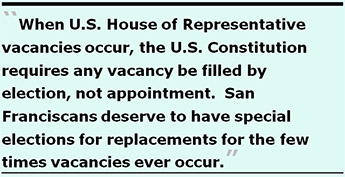 U.S. Senator Dianne Feinstein is the official opponent of this ballot measure. As former Mayor of San Francisco, she obviously doesn’t want any power taken away from the mayor’s office. But let’s be real: When a vacancy in California’s legislature occurs, the Governor is required to call for, and schedule, a special election within 14 days to elect a replacement.
U.S. Senator Dianne Feinstein is the official opponent of this ballot measure. As former Mayor of San Francisco, she obviously doesn’t want any power taken away from the mayor’s office. But let’s be real: When a vacancy in California’s legislature occurs, the Governor is required to call for, and schedule, a special election within 14 days to elect a replacement.
For U.S. Senate vacancies, 36 states, including California, allow the state governor to make an appointment to fill a vacancy, and appointees serve until the next regularly-scheduled, statewide general election. But 14 states require a special election be held to fill a U.S. Senator vacancy; nine of those allow a governor to make an interim appointment, but these are short-term appointments, since in most cases a special election is held within a few months. In four states, the seat remains vacant until filled by the voters at a special election.
When U.S. House of Representative vacancies occur, the U.S. Constitution requires any vacancy be filled by election, not appointment. All states require special elections to fill vacant House seats during the first session of a Congress. During the second session of a Congress, procedures vary depending on the amount of time between the vacancy and the next general election.
San Franciscans deserve to have special elections for replacements for the few times vacancies ever occur on the Board of Supervisors.
The City Controller says Prop. D would not have much of an impact on the cost of City government. The Controller notes that during a typical four-year election cycle, there might be one additional special election for a seat on the Board of Supervisors that would not have otherwise occurred, and based on Department of Elections’ costs, the estimated expense would be just $340,000 to hold a special election in a supervisorial district. Out of a $9.7 billion City budget, that’s a negligible amount. Don’t be suckered by Feinstein: Vote “Yes”!
 Prop. E: Maintaining Street Trees
Prop. E: Maintaining Street Trees
Prop. E. claims it will transfer responsibility for maintenance of street trees to the City, by establishing a Street Tree Maintenance Fund, and requires the City to allocate $19 million annually to the fund. It’s actually a budget set-aside from the General Fund. The City should simply budget tree maintenance as a routine line-item in the City budget.
Yes, we’ve had enough preventable tree accidents in San Francisco. On April 14, 2008, Kathleen Bolton was killed in Stern Grove by a falling Redwood tree branch. On August 12, 2016 Cui Ying Zhou was severely injured in Washington Square Park in North Beach when a 100-pound tree branch fell, hit her in the head, and broke her lower spine. She is now paralyzed and isn't expected to be able to walk again.
San Francisco has been on the hook to pay massive settlements involving personal injury claims. If San Francisco can afford paying these personal injury lawsuit settlements, it can damn well afford to create a tree maintenance fund to help prevent death and injury to innocent San Franciscans. After all, $19 million from a $9.6 billion City budget is a scant 0.2% set-aside of the City budget, well worth every penny.
However, the problem with Prop. E is not just that it’s a budget set-aside, its bigger problem is a credible report from an attendee at the Coalition of San Francisco Neighborhoods endorsement session who requested anonymity. Reportedly a CCSF supporter informed CSFN that a significant portion of revenue generated from the sugary-soda tax (Prop. V, below) and deposited into the General Fund would be allocated to City College, and the balance of the soda tax would be dedicated to street tree maintenance. This sounds like it’s double-dipping to fund tree maintenance, and the soda tax revenue would not go to its intended purpose of reducing the consumption of sugar-sweetened beverages. It’s also a regressive tax that will hit low- and middle-income San Franciscans the hardest. Don’t be suckered: Vote “No”!
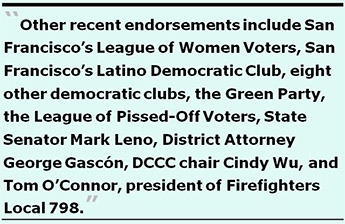 Prop. H: Public Advocate
Prop. H: Public Advocate
Given decades of soft-corruption in San Francisco that has largely gone uncorrected, it’s clear that San Franciscans deserve to have an elected Public Advocate to champion reforms. Please see article “Support Housing Commission, Public Advocate” in September’s Westside Observer, regarding creating an elected Public Advocate.
Senator Feinstein is also the official opponent of Pop. H. Meddling in City politics, she obviously doesn’t want any powers taken away from City Hall, hoping to preserve the status quo in San Francisco.
The Public Advocate’s Progress Report for 2015 in New York City lists a whole host of issues their public advocate has championed, including protecting children and families, protecting tenants and holding landlords accountable, combating gun violence, standing up for seniors, improving transparency and accountability in government, protecting immigrant communities, supporting veterans, and protecting the environment, among others.
In addition to endorsements by the Coalition of San Francisco Neighborhoods (CSFN), the Harvey Milk Democratic Club, and San Francisco’s Democratic County Central Committee (DCCC), other recent endorsements include San Francisco’s League of Women Voters, San Francisco’s Latino Democratic Club, eight other democratic clubs, the Green Party, the League of Pissed-Off Voters, several labor unions, State Senator Mark Leno, five current members of the Board of Supervisors, former Assemblyman Tom Ammiano, District Attorney George Gascón, former supervisor Bevan Dufty, DCCC chair Cindy Wu, and Tom O’Connor, president of Firefighters Local 798. Don’t be suckered by Feinstein: Vote “Yes”!
Prop. I: Funding for Seniors and Adults with Disabilities (a.k.a., “Dignity Fund”)
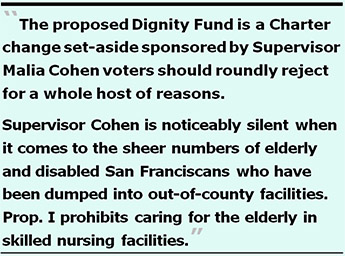 I am one of the few remaining advocates for Skilled Nursing Facilities (SNF’s) left standing in San Francisco. I do so, in part, in honor of my Mom, who was lucky enough to receive SNF level-of-care before she died two years ago. Even San Francisco Long-Term Care Ombudsman Benson Nadell appears to have abandoned supporting SNF level of care. It pains me deeply to oppose Prop. I.
I am one of the few remaining advocates for Skilled Nursing Facilities (SNF’s) left standing in San Francisco. I do so, in part, in honor of my Mom, who was lucky enough to receive SNF level-of-care before she died two years ago. Even San Francisco Long-Term Care Ombudsman Benson Nadell appears to have abandoned supporting SNF level of care. It pains me deeply to oppose Prop. I.
The proposed Dignity Fund is a Charter change set-aside sponsored by Supervisor Malia Cohen voters should roundly reject for a whole host of reasons. The San Francisco Chronicle quoted Cohen on September 24 as saying that “In San Francisco, we are leading the cause in taking care of our seniors,” and also said that “We have a responsibility to support them.” But Supervisor Cohen is noticeably silent when it comes to the sheer numbers of elderly and disabled San Franciscans who have been dumped into out-of-county facilities because San Francisco doesn’t want to take care of them. Prop. I prohibits caring for the elderly in skilled nursing facilities.
 The City Controller’s voter guide statement acknowledges Prop. I is not in compliance with our voter-adopted city policy regarding set-asides; instead Prop. I would create yet another set-aside reducing General Funds for other purposes.
The City Controller’s voter guide statement acknowledges Prop. I is not in compliance with our voter-adopted city policy regarding set-asides; instead Prop. I would create yet another set-aside reducing General Funds for other purposes.
It calls for a $38 million allocation in its first fiscal year, which happens to be mid-year in our current FY 2016–2017. That would immediately shoot a hole in the current City budget, requiring City Hall to suddenly locate $38 million to pour into the Dignity Fund.
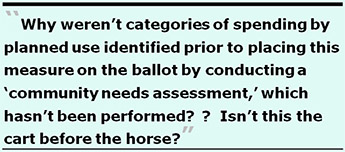 Over the 11 years of the proposed period, it will require additional contributions above and beyond the baseline $38 million. In year two, an additional $6 million will push the allocation to $44 million, and will require an additional $3 million in each year for nine years thereafter, through FY 2026–2027 when the appropriation will reach $71 million annually. Thereafter, the Dignity Fund may be increased during the next 10 years based on available discretionary revenues in the General Fund. By FY 2026–2027 alone, the Dignity Fund will have been awarded a cumulative $575 million, but nobody knows what it will be used for.
Over the 11 years of the proposed period, it will require additional contributions above and beyond the baseline $38 million. In year two, an additional $6 million will push the allocation to $44 million, and will require an additional $3 million in each year for nine years thereafter, through FY 2026–2027 when the appropriation will reach $71 million annually. Thereafter, the Dignity Fund may be increased during the next 10 years based on available discretionary revenues in the General Fund. By FY 2026–2027 alone, the Dignity Fund will have been awarded a cumulative $575 million, but nobody knows what it will be used for.
Why weren’t categories of spending by planned use identified prior to placing this measure on the ballot by conducting a “community needs assessment,” which hasn’t been performed? Isn’t this the cart before the horse?
Tellingly, the ballot measure appears to have been written in the absence of having performed a “community needs assessment” to identify whether $38 million in the first year, $44 million in the second year, or $71 million in FY 2026–2027 are necessary. Instead, after receiving the first $38 million in the current fiscal year and $44 million next fiscal year, DAAS intends to only then begin conducting a Community Needs Assessment starting in FY 2017–2018 after it has already received fully $82 million for as-yet unidentified “needs.”
The Controller’s voter guide statement also notes that in FY 2015–2016, the City’s general fund budget for these services was approximately $32 million. A follow-up records request to the Controller revealed that the proposed $38 million will probably supplant, not supplement, the Department of Aging and Adult Service’s (DAAS) existing budget, but it is unclear whether DAAS’s current $232.7 million budget (which grows to $249.4 million next year) will continue — in effect meaning the Dignity Fund may essentially end up being a supplement to DAAS’ existing budget — or whether the $32 million to $38 million in supplanted funding will be subtracted from DAAS’ existing budget and returned to the General Fund.
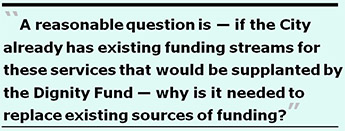 The City Controller’s Office acknowledged on August 4 that existing services to seniors and people with disabilities that match the list of eligible and ineligible services included in the proposed Dignity Fund are eligible for supplanting current funding sources. The Controller’s staff found appropriations for services that met the eligibility criteria in FY 2015–2016 totaled approximately $32 million. Only if (and after) the ballot measure passes will the Controller’s Office conduct a review to determine the final amount of FY 2016–2017 appropriations eligible for funding from the Dignity Fund.
The City Controller’s Office acknowledged on August 4 that existing services to seniors and people with disabilities that match the list of eligible and ineligible services included in the proposed Dignity Fund are eligible for supplanting current funding sources. The Controller’s staff found appropriations for services that met the eligibility criteria in FY 2015–2016 totaled approximately $32 million. Only if (and after) the ballot measure passes will the Controller’s Office conduct a review to determine the final amount of FY 2016–2017 appropriations eligible for funding from the Dignity Fund.
A reasonable question is — if the City already has existing funding streams for these services that would be supplanted by the Dignity Fund — why is it needed to replace (supplant) existing sources of funding? Nobody is saying how, or what, the freed-up $32 million in existing funding sources being supplanted would be used for.
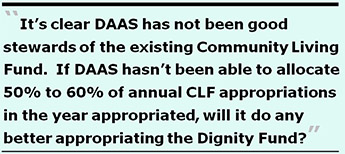 In addition, although the Legislative Digest posted on the Department of Elections web site — drafted by the City Attorney’s Office and finalized by the Ballot Simplification Committee, not by the Board of Supervisors Legislative Analyst (Harvey Rose’s outfit) — claimed that the City does not have a specific fund to pay for services to seniors and adults with disabilities, that’s complete nonsense.
In addition, although the Legislative Digest posted on the Department of Elections web site — drafted by the City Attorney’s Office and finalized by the Ballot Simplification Committee, not by the Board of Supervisors Legislative Analyst (Harvey Rose’s outfit) — claimed that the City does not have a specific fund to pay for services to seniors and adults with disabilities, that’s complete nonsense.
In 2007, San Francisco began diverting $3 million annually to the so-called “Community Living Fund” as a line-item in DAAS’ City budget. It was initially targeted to help discharge patients from Laguna Honda Hospital and Rehabilitation Facility (LHH), and to prevent discharges from San Francisco General Hospital into LHH, in order to help patients live in the community. By 2008, the waiting list for CLF services had already grown to an eight-month wait.
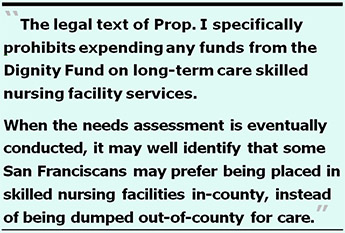 By FY 2014–2015, the CLF budget appropriations had surged to $4 million, but DAAS left $1.6 million either unencumbered and carried forward, or encumbered but carried forward. FY 2015–2017, the CLF budget appropriation climbed to $4.8 million, but DAAS left $2.4 million — half of the appropriation — either unencumbered and carried forward, or encumbered but carried forward. It’s clear DAAS has not been good stewards of the existing CLF, along with its partner, the Mayor’s Long-Term Care Coordinating Council (LTCCC). If DAAS hasn’t been able to allocate 50% to 60% of annual CLF appropriations in the year appropriated, will it do any better appropriating $38 million to $71 million annually?
By FY 2014–2015, the CLF budget appropriations had surged to $4 million, but DAAS left $1.6 million either unencumbered and carried forward, or encumbered but carried forward. FY 2015–2017, the CLF budget appropriation climbed to $4.8 million, but DAAS left $2.4 million — half of the appropriation — either unencumbered and carried forward, or encumbered but carried forward. It’s clear DAAS has not been good stewards of the existing CLF, along with its partner, the Mayor’s Long-Term Care Coordinating Council (LTCCC). If DAAS hasn’t been able to allocate 50% to 60% of annual CLF appropriations in the year appropriated, will it do any better appropriating $38 million to $71 million annually?
The City Controller’s Office acknowledged that “nothing in the proposed ballot measure explicitly replaces or removes the Community Living Fund” (CLF), but noted its review found that CLF services are eligible services under the proposed Dignity Fund and, therefore, existing CLF services may also be supplanted by the Dignity Fund.
To hedge its bets, the legal text of Prop. I specifically prohibits expending any funds from the Dignity Fund on medical health services (other than “behavioral” or mental health support services), and also expressly prohibits expending any of the $575 million Dignity Fund on services provided by hospitals and long-term care institutions (particularly not long-term care skilled nursing facilities).
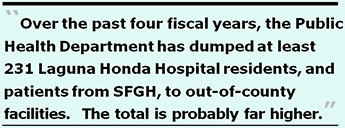 The measure’s sponsors included those exclusions even before conducting a community needs assessment, which forthcoming assessment might actually identify as legitimate services for funding that our elderly and people with disabilities may prefer as important services to them, despite DAAS’ and the LTCCC’s long-standing and absolute hatred of skilled nursing facilities.
The measure’s sponsors included those exclusions even before conducting a community needs assessment, which forthcoming assessment might actually identify as legitimate services for funding that our elderly and people with disabilities may prefer as important services to them, despite DAAS’ and the LTCCC’s long-standing and absolute hatred of skilled nursing facilities.
When the needs assessment is eventually conducted, it may well identify that some San Franciscans may prefer being placed in skilled nursing facilities in-county, instead of being dumped out-of-county for care.
Over the past four fiscal years, the Department of Public Health has dumped at least 99 residents from Laguna Honda Hospital and Rehabilitation Center to out-of-county facilities, along with at least 132 patients from San Francisco General Hospital discharged out-of-county not admitted to LHH. That totals 231 out-of-county discharges over just four years.
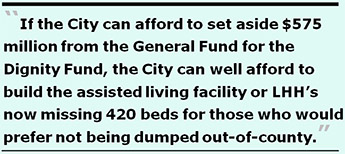 This total is probably far higher, since DPH claims collection of out-of-county discharges began in FY 2012–2013, but DPH’s databases clearly have discharge destination data prior to then, but refuses to disclose how many more out-of-county discharges from LHH and SFGH there were prior to FY 2012–2013.
This total is probably far higher, since DPH claims collection of out-of-county discharges began in FY 2012–2013, but DPH’s databases clearly have discharge destination data prior to then, but refuses to disclose how many more out-of-county discharges from LHH and SFGH there were prior to FY 2012–2013.
The out-of-county patient dumping is due in part because the City eliminated 420 beds from the LHH replacement facility rebuild, and eliminated the proposed Assisted Living beds promised for LHH’s campus, both of which were cut due to projected costs of approximately $220 million each to build.
If the City can afford to set aside $575 million from the General Fund for the Dignity Fund, the City can well afford to either build the assisted living facility or LHH’s now missing 420 skilled nursing beds for those who would prefer living there, not being dumped out-of-county.
Even San Francisco Examiner columnist Sally Stephens opposes the Prop. I budget set-aside, although she didn’t mention it would set aside $575 million over the life of the measure. Don’t be suckered by Supervisor Cohen: Vote “No”!
Prop. J: Funding for Homelessness and Transportation
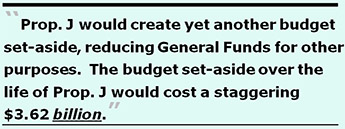 The City Controller’s voter guide statement acknowledges Prop. J is also not in compliance with the voter-adopted city policy regarding set-asides; instead Prop. J would create yet another budget set-aside, reducing General Funds for other purposes. And the budget set-aside over the life of this measure would cost a staggering $3.62 billion.
The City Controller’s voter guide statement acknowledges Prop. J is also not in compliance with the voter-adopted city policy regarding set-asides; instead Prop. J would create yet another budget set-aside, reducing General Funds for other purposes. And the budget set-aside over the life of this measure would cost a staggering $3.62 billion.
For the Homelessness part of this ballot measure, over the 25-year period of this Charter change through FY 2040–2041, $1.21 billion would be redirected from the General Fund to a new Homeless Housing and Services Fund, with the entirety apparently coming from the General Fund.
For the Transportation part of this ballot measure, over the same 25-year period, $2.41 billion would either be redirected from the General Fund to a new Transportation Improvement Fund, or alternatively, the ballot measure authorizes the City to issue lease revenue bonds or lease financing arrangements for certain categories in the Transportation Improvement Fund by issuing indebtedness secured by money deposited into the Transportation Fund. Neither the Controller’s Statement in the voter guide nor the legal text of the ballot measure indicate how much indebtedness would be issued, and at what interest rates, so it’s unknown how much debt will be incurred by issuing lease revenue bonds or other lease financing instruments.
Once again, street repaving is part of the Transportation Fund. Up to 32.9% of annual appropriations into the fund would be directed to the Department of Public Works for street resurfacing, rather than actually budgeting for street repairs in the City budget. Don’t be suckered: Vote “No”!
Prop. K: General Sales Tax
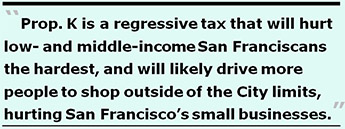 Prop. K would increase the local sales tax rate by 0.75% (three-quarters of one percent) as of April 2017, for a period of 25 years. The three-quarter cent sales tax is a general tax; proceeds would be deposited into the General Fund for any General Fund use. It will push the local sales from 8.75% to 9.5%, although 0.25% of the state portion of the sales tax will expire at the end of December 2016, in effect making our tax rate 9.25% if Prop. K passes. However, should the State of California resume the 0.25% to the sales tax in the future, we’d be back to a 9.5% sales tax.
Prop. K would increase the local sales tax rate by 0.75% (three-quarters of one percent) as of April 2017, for a period of 25 years. The three-quarter cent sales tax is a general tax; proceeds would be deposited into the General Fund for any General Fund use. It will push the local sales from 8.75% to 9.5%, although 0.25% of the state portion of the sales tax will expire at the end of December 2016, in effect making our tax rate 9.25% if Prop. K passes. However, should the State of California resume the 0.25% to the sales tax in the future, we’d be back to a 9.5% sales tax.
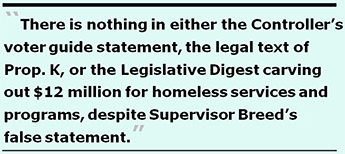 This is a regressive tax that will hurt low- and middle-income San Franciscans the hardest, and will likely drive more people to shop outside of the City limits, hurting San Francisco’s small businesses. Sales lost in San Francisco to other jurisdictions will more than likely offset any new sales tax revenue, making it an even draw.
This is a regressive tax that will hurt low- and middle-income San Franciscans the hardest, and will likely drive more people to shop outside of the City limits, hurting San Francisco’s small businesses. Sales lost in San Francisco to other jurisdictions will more than likely offset any new sales tax revenue, making it an even draw.
Board President London Breed’s September 2016 newsletter claims that the Board of Supervisors had passed the FY 2016–2017 budget that “put a sales tax measure on the ballot that will bring in $12 million for homelessness programs.”
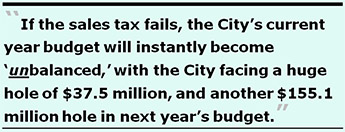 However, there is nothing in either the Controller’s voter guide statement, the legal text of Prop. K, or the Legislative Digest saying that any of the estimated $37.5 million that will be generated from the sales tax in FY 2016–2017 or the estimated $155.1 million in FY 2017–2018 and following years will carve out $12 million for homeless services and programs. Instead, the Controller notes that the tax is a general tax and proceeds would be deposited into the General Fund. If any of the sales tax were earmarked for homeless programs — or for any other stated purpose — it would require a 66.6% approval by voters, rather than the 50%+1 voter approval for this tax.
However, there is nothing in either the Controller’s voter guide statement, the legal text of Prop. K, or the Legislative Digest saying that any of the estimated $37.5 million that will be generated from the sales tax in FY 2016–2017 or the estimated $155.1 million in FY 2017–2018 and following years will carve out $12 million for homeless services and programs. Instead, the Controller notes that the tax is a general tax and proceeds would be deposited into the General Fund. If any of the sales tax were earmarked for homeless programs — or for any other stated purpose — it would require a 66.6% approval by voters, rather than the 50%+1 voter approval for this tax.
What’s worse? The City’s current year “balanced” budget introduced by the Mayor and adopted by the Board of Supervisors hinges on passage of the sales tax in November. If the sales tax fails, the City’s current year budget will instantly become “unbalanced,” with the City facing a huge hole of $37.5 million, and another $155.1 million hole in next year’s budget. Don’t be suckered: Vote “No”!
Prop. M: Housing and Development Commission
 Please see article “Support Housing Commission, Public Advocate” in the September Westside Observer, regarding creating a commission having oversight of the Mayor’s Office of Housing and Community Development.
Please see article “Support Housing Commission, Public Advocate” in the September Westside Observer, regarding creating a commission having oversight of the Mayor’s Office of Housing and Community Development.
Senator Feinstein is the official opponent of Prop. M, as well. Meddling in City politics, she obviously doesn’t want any powers taken away from the Office of the Mayor.
In addition to endorsements from CSFN, the Harvey Milk Democratic Club, San Francisco’s Latino Democratic Club, and San Francisco’s Democratic County Central Committee (DCCC), and others, additional recent endorsements include the San Francisco Community Land Trust, the San Francisco Council of Community Housing Organizations whose co-directors are housing experts Peter Cohen and Fernando Marti, former Mayor Art Agnos, former Supervisors Sophie Maxwell and Bevan Dufty, and D-1 Supervisorial candidate Sandra Lee Fewer. Don’t be suckered by Feinstein: Vote “Yes”!
Prop. P: Competitive Bidding for Affordable Housing Projects on City-Owned Property
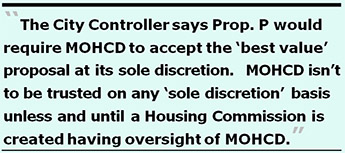 The Association of Realtors spent more than $250,000 to pay for petition signatures to qualify Prop. P and Prop. U for the ballot. Developers and real-estate speculators are behind both measures. Prop. P seeks to shift affordable housing projects away from nonprofits to private developers.
The Association of Realtors spent more than $250,000 to pay for petition signatures to qualify Prop. P and Prop. U for the ballot. Developers and real-estate speculators are behind both measures. Prop. P seeks to shift affordable housing projects away from nonprofits to private developers.
The City Controller’s statement in the voter guide says that the proposed ordinance would require that the Mayor’s Office of Housing and Community Development (MOHCD) receive at least three bids or proposals, and accept the “best value” proposal (determined at the sole discretion of MOHCD), for any affordable housing project on City-owned property that would use money from various City affordable housing funds.
The Controller also says that Prop. P would require MOHCD to continue soliciting project bids until at least three bids are submitted, and to the extent MOHCD has to prepare multiple solicitations it could result in additional administrative costs and project delays resulting from lengthier solicitation periods that could increase overall project costs.
MOHCD is not to be trusted on any “sole discretion” basis unless and until a Housing Commission is created having oversight of MOHCD. Don’t be suckered by the Association of Realtors: Vote “No”!
Prop. S: Allocation of Hotel Tax Funds (for Homeless Families and Arts)
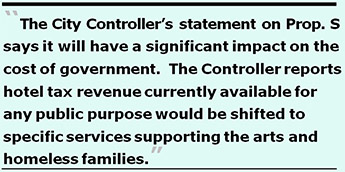 Prop. S will dedicate a portion of the City’s hotel tax revenue that is currently available for any public purpose to specific services that support the arts and homeless families. In other words, it is yet another budget set-aside that will reduce General Funds available for other purposes.
Prop. S will dedicate a portion of the City’s hotel tax revenue that is currently available for any public purpose to specific services that support the arts and homeless families. In other words, it is yet another budget set-aside that will reduce General Funds available for other purposes.
Prop. S would, in part, create a new “Ending Family Homelessness Fund.” Just how many separate kinds of homeless “Funds” for various sub-categories of homeless people is San Francisco going to create on top of the massive funding the City already provides to end homelessness?
The City Controller’s statement on Prop. S says it will have a significant impact on the cost of government. The Controller reports that the City’s hotel tax revenue that is currently available for any public purpose would be shifted to specific services supporting the arts and homeless families, and as funds are shifted to other purposes, other City spending would have to be reduced or new revenues identified to maintain current service levels.
Budget allocations for public transit, youth services, libraries, and schools previously adopted by voters would be reduced by approximately $24 million in FY 2020–2021, and another $32 million would be shifted in FY 2020–2021 from the City’s general fund discretionary budget. Losing $56 million involves big bucks. Don’t be suckered: Vote “No”!
Prop. U: Affordable Housing Requirements for Market-Rtae Development Projects
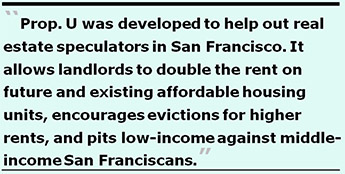 The proponent of Prop. U is Thomas A. Hsieh. Both Tom Hsieh, Sr. and his son Thomas Hsieh, Jr. who is a member of the San Francisco Democratic County Central Committee (DCCC), and a key ally of real estate lobbyists, have taken out paid arguments in the voter guide supporting Prop. U. Again, the Association of Realtors spent more than $250,000 to pay for petition signatures to qualify Prop. P and Prop. U for the ballot.
The proponent of Prop. U is Thomas A. Hsieh. Both Tom Hsieh, Sr. and his son Thomas Hsieh, Jr. who is a member of the San Francisco Democratic County Central Committee (DCCC), and a key ally of real estate lobbyists, have taken out paid arguments in the voter guide supporting Prop. U. Again, the Association of Realtors spent more than $250,000 to pay for petition signatures to qualify Prop. P and Prop. U for the ballot.
Prop. U was developed to help out real estate speculators in San Francisco, principally by increasing the maximum household income limit for on-site affordable rental housing units from 55% of area median income (AMI) to 110% of AMI. It allows landlords to double the rent on future and existing affordable housing units, encourages evictions for higher rents, and pits low-income against middle-income San Franciscans.
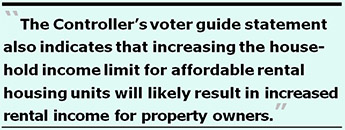 Prop. U also sets the maximum allowable rent for these units at 30% of the annual gross income of the qualifying household, in effect restricting the amount of rent households with higher incomes will have to pay.
Prop. U also sets the maximum allowable rent for these units at 30% of the annual gross income of the qualifying household, in effect restricting the amount of rent households with higher incomes will have to pay.
The City Controller’s voter guide statement also indicates that increasing the household income limit for affordable rental housing units will likely result in increased rental income for property owners, meaning that to the extent higher- income households apply for and are placed in these affordable rental units, property owners will favor higher-income applicants over lower-income applicants, because even with a cap of rents at 30% of gross income, the property owners will be able to earn higher rents from people earning 110% of AMI (which can range up to $112,100 for a four-person household).
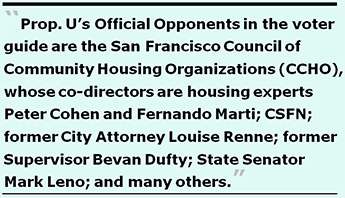 Obviously those earning 55% of AMI earn half the income of those earning 110% of AMI, and a cap of rent of 30% of income is correspondingly higher for landlords. After all, landlords will be able to double rents for a one-bedroom affordable housing unit capped at 30% of income from $1,121 monthly to $2,241 monthly.
Obviously those earning 55% of AMI earn half the income of those earning 110% of AMI, and a cap of rent of 30% of income is correspondingly higher for landlords. After all, landlords will be able to double rents for a one-bedroom affordable housing unit capped at 30% of income from $1,121 monthly to $2,241 monthly.
Prop. U’s Official Opponents in the voter guide are the San Francisco Council of Community Housing Organizations (CCHO), whose co-directors are housing experts Peter Cohen and Fernando Marti; CSFN; former City Attorney Louise Renne; former Supervisor Bevan Dufty; State Senator Mark Leno; and many others.
I’m with Mr. Cohen and Mr. Marti: Don’t be suckered by real estate lobbyists: Vote “No”!
Prop. V: Tax on Distributing Sugar-Sweetened Beverages
As noted in the discussion of Prop. E above, a significant portion of revenue generated from the sugary-soda tax (Prop. V, below) and deposited into the General Fund would be allocated to City College, and the balance of the soda tax would be dedicated to street tree maintenance. Soda tax revenue will not go to its intended purpose of reducing the consumption of sugar-sweetened beverages. It’s also a regressive tax that will hit low- and middle-income San Franciscans the hardest. Don’t be suckered: Vote “No”!
Board of Supervisors Seats
District 1
 Voters in the Richmond District rejected David Lee in 2012; they should do so again. His campaign website has an “Issues” page, which lists short paragraphs on just three issues: Pedestrian Safety (two sentences), Transportation (two sentences), and Affordable Housing (which contained just one sentence). Sadly, his web site doesn’t have an “Endorsements” page, so it isn’t known who, if anyone, is supporting him.
Voters in the Richmond District rejected David Lee in 2012; they should do so again. His campaign website has an “Issues” page, which lists short paragraphs on just three issues: Pedestrian Safety (two sentences), Transportation (two sentences), and Affordable Housing (which contained just one sentence). Sadly, his web site doesn’t have an “Endorsements” page, so it isn’t known who, if anyone, is supporting him.
In stark contrast, Sandra Lee Fewer’s web site “Issues” page lists 10 issues, illustrating her broad commitment to a variety of issues facing not only the Richmond District, but all of San Francisco. Sandra’s “Endorsements” page is jam-packed with extensive endorsements from state and local officials, former City officials, City commissioners, community leaders, labor unions, community groups, and school district leaders. Her endorsements page is well worth taking a look at.
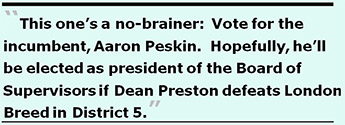 Don’t be suckered by David Lee: Vote for Sandra Lee Fewer!
Don’t be suckered by David Lee: Vote for Sandra Lee Fewer!
District 3
This one’s a no-brainer: Vote for incumbent Aaron Peskin! Hopefully, he’ll be elected president of the Board of Supervisors if Dean Preston defeats London Breed in District 5!District 5
 D-5’s current incumbent, Supervisor London Breed, has claimed all along that she is completely independent of the Willie L. Brown “machine,” and claims she’s her own person, which is hilarious on the face of it since she’s beholden to billionaire Ron Conway. As recently as November 2015, Breed attended a meeting of the Police Officer’s Association (POA) seeking to obtain the POA’s endorsement of then-incumbent Julie Christensen in the District 3 election. Breed — obviously a “moderate” on the Board of Supervisors — “lobbied” the POA to retain “moderate” Christensen in my district, D-3, which has also long been a progressive district.
D-5’s current incumbent, Supervisor London Breed, has claimed all along that she is completely independent of the Willie L. Brown “machine,” and claims she’s her own person, which is hilarious on the face of it since she’s beholden to billionaire Ron Conway. As recently as November 2015, Breed attended a meeting of the Police Officer’s Association (POA) seeking to obtain the POA’s endorsement of then-incumbent Julie Christensen in the District 3 election. Breed — obviously a “moderate” on the Board of Supervisors — “lobbied” the POA to retain “moderate” Christensen in my district, D-3, which has also long been a progressive district.
Breed’s now pretending to support “progressive” values only because she faces a progressive challenger, Dean Preston.
 Sadly, Breed complained in her September 22 Op-Ed in the San Francisco Examiner that some have said she doesn’t “belong” in the D-5 supervisors seat. This isn’t about Breed’s race.
Sadly, Breed complained in her September 22 Op-Ed in the San Francisco Examiner that some have said she doesn’t “belong” in the D-5 supervisors seat. This isn’t about Breed’s race.
Instead, this is about whether a traditionally progressive district like D-5 — the City’s most progressive district — wants a “moderate” supervisor representing them. It isn’t about whether she’s African American. It’s about her clear four-year record as a member of the moderate caucus on the Board of Supe’s.
Breed bitterly fought release of her official “Prop. G” calendar required to be released under the Sunshine Ordinance because she didn’t want members of the public — and Dean Preston — knowing who she was meeting with and on which topics. She lost, and had to produce those recurring calendars.
Tellingly, Breed’s “Endorsements” page on her campaign web site shows the “moderate” faction of the Board of Supervisors — Supervisors Scott Wiener, Mark Farrell, Katy Tang, and Malia Cohen — have all endorsed Breed. 48Hills.org initially reported that “Ron Conway, a major investor in Airbnb, and four of his family members gave the maximum allowable individual contributions to candidate Breed in 2012.” In an update, 48Hills reported that Conway and his wife contributed “more than” $50,000 to an independent-expenditure committee that attacked Breed’s principal opponent in the race.” In addition to her ties to Conway, Breed’s housing record is shameful.
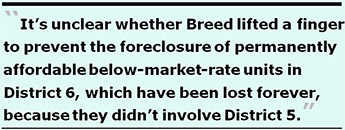 Worse, Breed is reportedly backing moderate candidates in supervisorial contests in Districts 1, 9, and 11 (endorsing Marjan Philhour over Sandra Lee Fewer in D-1, Josh Arce over Hillary Ronen in D-9, and Ahsha Safai over Kimberly Alvarenga in D-11), showing Breed’s true colors.
Worse, Breed is reportedly backing moderate candidates in supervisorial contests in Districts 1, 9, and 11 (endorsing Marjan Philhour over Sandra Lee Fewer in D-1, Josh Arce over Hillary Ronen in D-9, and Ahsha Safai over Kimberly Alvarenga in D-11), showing Breed’s true colors.
Although Breed and her colleague Supervisor Malia Cohen have reportedly been very frustrated after pressuring the Mayor’s Office of Housing and Community Development (MOHCD) regarding transparency of below-market-rate (BMR) housing issues, Breed failed to support Prop. M to create a Board or Commission having oversight of MOCHD.
And although Supervisor Peskin’s office had prodded MOHCD about the possible foreclosure of permanently affordable below-market-rate units, it’s unclear whether Breed lifted a finger to prevent the foreclosure of those units in District 6, which have been lost forever, because they didn’t involve District 5. Don’t be suckered by Ms. Breed: Vote for Dean Preston!
District 7
 Candidate-for-Supervisor Joel Engardio comically claimed during the recent West of Twin Peaks Central Council D-7 candidate debate and again in the San Francisco Examiner on September 18, 2016 that San Francisco has “30,000 employees.” He whined that we’ve added more employees since 2010. Like Donald Trump, Engardio isn’t telling you the complete truth. It’s time to call out a lie for what it is.
Candidate-for-Supervisor Joel Engardio comically claimed during the recent West of Twin Peaks Central Council D-7 candidate debate and again in the San Francisco Examiner on September 18, 2016 that San Francisco has “30,000 employees.” He whined that we’ve added more employees since 2010. Like Donald Trump, Engardio isn’t telling you the complete truth. It’s time to call out a lie for what it is.
The City may have 30,000 so-called “Full-Time Equivalents” (FTE’s), but the City actually has 40,397 full- and part-time employees as of June 30, 2016 who are creatively “averaged” into FTE’s. By converting 21,933 part-time employees — over half of all City employees — into the magical-thinking number of 12,179 FTE’s, Engardio and the Chronicle essentially eliminated 9,754 part-timers who had been “averaged” into FTE status. That “average” number of FTE’s was then wrongly reported by the San Francisco Chronicle as earning $108,774 “average” salaries, despite the fact that the City Controller has since confirmed the average salary of all 40,397 City employees is actually just $78,401, not $108,774.
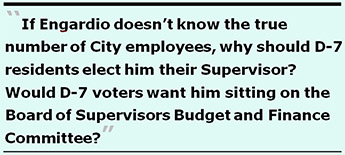 As any middle-school student learns in algebra, there’s only one formula for calculating average salaries: You add up the sum of all salaries divided by the count of all employees, not by the count of the “average” number of FTE’s, which in itself is already an average, contrived number. The only formula to calculate an average isn’t rocket science; it’s basic math, and there’s only one formula to calculate any average. Perhaps Engardio skipped — or flunked — algebra.
As any middle-school student learns in algebra, there’s only one formula for calculating average salaries: You add up the sum of all salaries divided by the count of all employees, not by the count of the “average” number of FTE’s, which in itself is already an average, contrived number. The only formula to calculate an average isn’t rocket science; it’s basic math, and there’s only one formula to calculate any average. Perhaps Engardio skipped — or flunked — algebra.
If Engardio doesn’t know the true number of City employees, why should D-7 residents elect him their Supervisor? Would D-7 voters want him sitting on the Board of Supervisors Budget and Finance Committee?
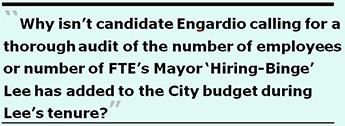 Although Engardio frets about the number of employees added since 2010, he won’t publicly admit that 8,620 of the additional full- and part-time employees added to the City’s payroll were added under the watch of Mayor Ed Lee, or that those additional employees represent fully 27.1% of the City’s now 40,397 employee headcount. Alternatively, the 8,620 full- and part-time employees represent 6,414 additional FTE’s added under Lee’s watch. Why isn’t candidate Engardio calling for a thorough audit of the number of employees or number of FTE’s Mayor “Hiring-Binge” Lee has added to the City budget during Lee’s tenure since he assumed office?
Although Engardio frets about the number of employees added since 2010, he won’t publicly admit that 8,620 of the additional full- and part-time employees added to the City’s payroll were added under the watch of Mayor Ed Lee, or that those additional employees represent fully 27.1% of the City’s now 40,397 employee headcount. Alternatively, the 8,620 full- and part-time employees represent 6,414 additional FTE’s added under Lee’s watch. Why isn’t candidate Engardio calling for a thorough audit of the number of employees or number of FTE’s Mayor “Hiring-Binge” Lee has added to the City budget during Lee’s tenure since he assumed office?
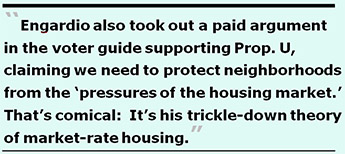 Engardio also took out a paid argument in the voter guide supporting Prop. U, claiming we need to protect neighborhoods from the “pressures of the housing market.” That’s comical: It’s his trickle-down theory of market-rate housing to allow landlords to double the rent on future and existing affordable housing units. Those who face the “pressures of the housing market” will be low-income, pitted against middle-income, San Franciscans.
Engardio also took out a paid argument in the voter guide supporting Prop. U, claiming we need to protect neighborhoods from the “pressures of the housing market.” That’s comical: It’s his trickle-down theory of market-rate housing to allow landlords to double the rent on future and existing affordable housing units. Those who face the “pressures of the housing market” will be low-income, pitted against middle-income, San Franciscans.
Engardio also railed in his Examiner Op-Ed that voters should carefully consider too many budget “set-asides” on the November ballot. I have to wonder whether he will oppose the “Dignity Fund” budget set aside that may increase the number of San Franciscans discharged to out-of-county facilities, given the restriction that the Dignity Fund can’t be used for long-term care “institutional” skilled nursing care.
D-7 rejected Engardio in 2012 by an overwhelming majority; he came in fourth place in 2012. Don’t be suckered by Engardio:
Vote for John Farrell, who actually understands the difference between FTE’s and actual employees!
District 9
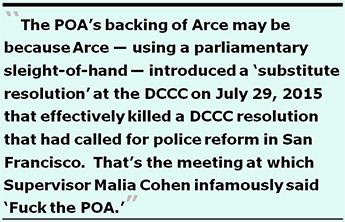 48Hills.org reported on September 7 that there’s a lot of money flowing into the District 9 supervisor race from an independent expenditure committee called San Franciscans for a City that Works that is supporting Joshua Arce in D-9.
48Hills.org reported on September 7 that there’s a lot of money flowing into the District 9 supervisor race from an independent expenditure committee called San Franciscans for a City that Works that is supporting Joshua Arce in D-9.
Public records show that this independent expenditure committee is being funded by the Laborer’s Union and the San Francisco Police Officers Association (POA). Arce — who is developer-friendly and real estate speculator-friendly — is an attorney who works for Laborers International Union Local 261 as a “Community Liaison.” He was nominated for a seat on the Democratic County Central Committee by Mary Jung, the former Chair of the DCCC who is a registered real estate lobbyist. Jung also nominated and backed appointment of Joel Engardio to the DCCC.
48Hills’ September 7 article reported Arce may have violated Ethics Commission rules that prohibit any candidate for office from “coordinating” with independent expenditure committees.
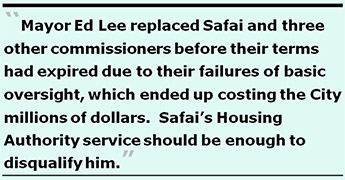 The POA’s backing of Arce may be because Arce — using a parliamentary sleight-of-hand — introduced a “substitute resolution” at the DCCC on July 29, 2015 that effectively killed a DCCC resolution that had called for police reform in San Francisco. That’s the meeting at which Supervisor Malia Cohen infamously said “Fuck the POA.”
The POA’s backing of Arce may be because Arce — using a parliamentary sleight-of-hand — introduced a “substitute resolution” at the DCCC on July 29, 2015 that effectively killed a DCCC resolution that had called for police reform in San Francisco. That’s the meeting at which Supervisor Malia Cohen infamously said “Fuck the POA.”
Don’t be suckered by Arce, his real-estate backers, and the POA: Vote for Hillary Ronen!
District 11
Nato Green reported in the San Francisco Examiner also on September 18, 2016 that in 2010, then-Mayor Gavin Newsom appointed Ahsha Safai to San Francisco’s Housing Authority Commission. During Safai’s term, the Housing Authority didn’t review the Housing Authority’s financial statements during a 17-month period, and didn’t address financial risks in those financial statements.
 Worse, the Housing Authority didn’t bother recording its meetings so there’s no audio record of those meetings. Following three discrimination and retaliation lawsuits by former Housing Authority employees, the Commission’s director, Henry Alvarez was fired, and Mayor Ed Lee replaced Safai and three other commissioners before their terms had expired due to their failures of basic oversight, which ended up costing the City millions of dollars. Safai’s Housing Authority service should be enough to disqualify him from becoming D-11’s Supervisor.
Worse, the Housing Authority didn’t bother recording its meetings so there’s no audio record of those meetings. Following three discrimination and retaliation lawsuits by former Housing Authority employees, the Commission’s director, Henry Alvarez was fired, and Mayor Ed Lee replaced Safai and three other commissioners before their terms had expired due to their failures of basic oversight, which ended up costing the City millions of dollars. Safai’s Housing Authority service should be enough to disqualify him from becoming D-11’s Supervisor.
Safai can be counted on to support real estate speculators, not renters or affordable housing policies, given his family’s brisk real estate business. Mayor Lee and his real estate pals are backing Safai, despite the fact that Ed Lee had removed Safai from the SFHA commission before the end of his term. Don’t be suckered by Safai: Vote for Francisco Herrera!
A Word on Budget Set-Asides
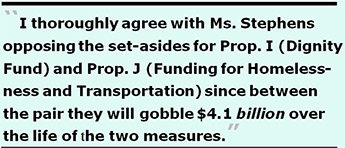 The Prop. E Tree Maintenance Fund set-aside that would allocate $19 million annually out of the City’s $9.7 billion budget — just 0.2% — is peanuts.
The Prop. E Tree Maintenance Fund set-aside that would allocate $19 million annually out of the City’s $9.7 billion budget — just 0.2% — is peanuts.
But I agree with columnist Sally Stephens who opposed the use of budget set-asides for Prop.’s E, I, and J in her September 25 San Francisco Examiner column.
Since the Supervisors have failed all along to dedicate tree maintenance in the City budget after San Franciscans have been killed or paralyzed by falling tree branches, it’s tempting to take matters into our own hands and create this set-aside before more people are injured due to the City’s maintenance neglect. We shouldn’t be so tempted.
Stephens noted, in part:
“The mayor and supervisors have access to about $2.9 billion [in discretionary funds in the General Fund]. This discretionary money funds many important city services, including paving streets, police and fire, and public health.
Every time voters approve a new set-aside, however, there’s less money left for these city services. Each set-aside is essentially a trade-off — we fund this program, but that may mean another needed program cannot be funded.
…
When voters decide on a set-aside, we’re not asked if want to fund parks, for example, at the expense of filling potholes. We’re just asked if we want to fund parks. Most vote for the benefit, without knowing its cost — what won’t get done because we funded set-asides.”
I thoroughly agree with Ms. Stephens opposing the set-asides for Prop. I (Dignity Fund) and Prop. J (Homelessness and Transportation), since between the pair they will gobble $4.1 billion over the life of the two measures, if not more. The set-asides are truly a lazy way to govern, as Stephens notes.
Well, these are my recommendations. You have a month to figure out how you’ll vote for everything else on the jam-packed ballot. And remember: If you don’t vote, you can’t complain afterwards.
Monette-Shaw is an open-government accountability advocate, a patient advocate, and a member of California’s First Amendment Coalition. He received a James Madison Freedom of Information Award from the Society of Professional Journalists-Northern California Chapter in 2012. He can be contacted at monette-shaw@westsideobserver.com.